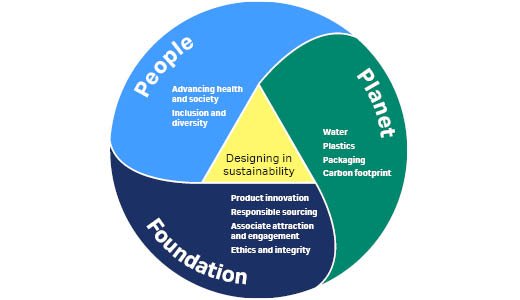Cytiva launches sustainability plan - ‘Designing in sustainability’
13 May 2021 | Thursday | News

- Cytiva sets out a sustainability plan to positively affect people and the planet, which underpins business resilience in a fast-changing world
- Performance highlights include: 1.2% absolute reduction of CO2e emissions and 6.5% reduction of absolute water consumption since 2019, even as demand and deliveries have grown
- 2025 targets include 100% of sites powered exclusively by renewable electricity, up from 19% of sites which currently operate only on renewable electricity
Among its 2020 performance highlights, Cytiva reports that while its business grew significantly, CO2e impacts were reduced by 1.2% and water use by 6.5%. Cytiva participated in the majority of the 400 global COVID-19 vaccine initiatives ongoing in 2020. While the pandemic contributed to growing demand for Cytiva products and services, it also deepened the company’s understanding of the crucial role that the life sciences industry plays in the well-being of society.
Cytiva intends to significantly reduce its environmental footprint as its business expands. Emmanuel Ligner, Cytiva President and CEO, says sustainability is integral to the success of Cytiva and its customers, as well as the planet and society. He says: “Our vision is a world in which access to life-changing therapies transforms human health. With the emphasis on access and transformation, this vision goes to the heart of our contribution to a sustainable society. After all, we are only guardians of this business for the next generation.”
“Designing in Sustainability” is Cytiva’s plan to make a positive impact on people and the planet and to build the foundation for a resilient company. It includes 2025 targets to increase inclusion and diversity, reduce energy and emissions, and optimize plastics, packaging, and water use.
Emmanuel Ligner continues: ”The biotechnology industry is deeply committed to its purpose of bringing innovative medicines to the world. To do this, we consume energy, water, and raw materials. Our industry must be ready to re-examine choices and consider impacts in the decisions we make. No one company can deliver on this purpose alone.”
Collaborations with customers and suppliers
By 2025, Cytiva is working to ensure that 100% of sites are powered exclusively by renewable electricity, compared to just 19% of sites today. With regard to plastics, the target is to ensure that 50% of single-use (disposable) products and components are widely acceptable for recycling. With this in mind, Cytiva is piloting an innovative program with U.S. zero-waste company TerraCycle to collect previously un-recyclable plastic syringe filters and turn them into something new.
In addition, strategic work with customers will examine the full life cycle of products and services, from discovery to delivery. Emmanuel Abate, Head of Sustainability, says: “Partnering with customers like Roche and Bayer’s biotech operations has been critical when looking at big challenges like managing plastics.”
André Hoffman, Vice-Chairman and family owner, Roche, says: “Sustainability is an integral part of the way we do business at Roche and I’m excited about the strategic partnership we have with Cytiva. This will help us jointly find new manufacturing processes which bring us closer to the goal of minimizing our impact on the environment.”
On the social side, Cytiva is helping enrich the life sciences sector with greater diversity. In 2020, Cytiva kicked off a collaboration with the Biomedical Science Careers Program (BSCP) to increase access to scientific education for under-represented minority and disadvantaged individuals.
Engaging suppliers has been key to identifying areas of improvement. All of Cytiva’s suppliers are expected to uphold high standards in relation to environmental protection, human and labor rights, and anti-corruption, all of which reflect the Danaher code of conduct. Within the past six months, 20% of Cytiva’s suppliers have completed a sustainability assessment.
Innovation motivating associates
Cytiva is also investing in associate-driven sustainability efforts via the Innovation Accelerator. In 2020, six volunteer teams proposed USD 3.8 million worth of sustainability projects. All projects were funded, covering: new ways to perform remote factory acceptance testing; improvements to manufacturing processes with regard to water use, chemicals, and additive manufacturing; transforming product packaging to be more sustainable; as well as creating alternative opportunities to work with single-use plastics.
Emmanuel Abate says: “The biggest challenge for Cytiva is to meet the needs of patients today but not at the expense of future generations’ ability to meet their needs. In 2020, we proved we can meet both challenges. Results like these motivate us to do more.”
Most Read
- How Does GLP-1 Work?
- Innovations In Magnetic Resonance Imaging Introduced By United Imaging
- Management of Relapsed/Refractory Multiple Myeloma
- 2025 Drug Approvals, Decoded: What Every Biopharma Leader Needs to Know
- BioPharma Manufacturing Resilience: Lessons From Capacity Expansion and Supply Chain Resets from 2025
- APAC Biopharma Review 2025: Innovation, Investment, and Influence on the Global Stage
- Top 25 Biotech Innovations Redefining Health And Planet In 2025
- The New AI Gold Rush: Western Pharma’s Billion-Dollar Bet on Chinese Biotech
- Single-Use Systems Are Rewiring Biopharma Manufacturing
- The State of Biotech and Life Science Jobs in Asia Pacific – 2025
- Asia-Pacific Leads the Charge: Latest Global BioSupplier Technologies of 2025
- Invisible Threats, Visible Risks: How the Nitrosamine Crisis Reshaped Asia’s Pharmaceutical Quality Landscape
Bio Jobs
- Sanofi Turns The Page As Belén Garijo Steps In And Paul Hudson Steps Out
- Global Survey Reveals Nearly 40% of Employees Facing Fertility Challenges Consider Leaving Their Jobs
- BioMed X and AbbVie Begin Global Search for Bold Neuroscience Talent To Decode the Biology of Anhedonia
- Thermo Fisher Expands Bengaluru R&D Centre to Advance Antibody Innovation and Strengthen India’s Life Sciences Ecosystem
- Accord Plasma (Intas Group) Acquires Prothya Biosolutions to Expand Global Plasma Capabilities
- ACG Announces $200 Million Investment to Establish First U.S. Capsule Manufacturing Facility in Atlanta
- AstraZeneca Invests $4.5 Billion to Build Advanced Manufacturing Facility in Virginia, Expanding U.S. Medicine Production
News











